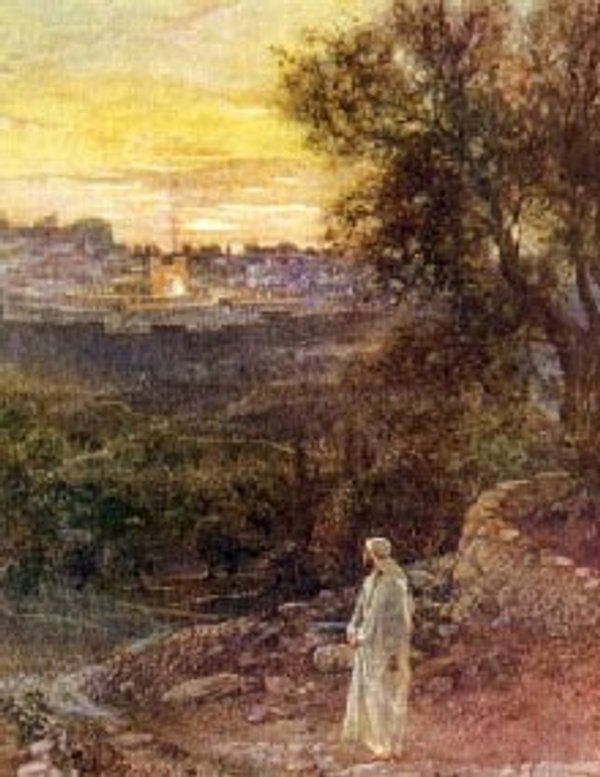The Gospel of the Mass concludes with the announcement that the Apostles will leave Christ alone during his Passion. When Simon Peter, full of presumption, affirms “I will give my life for you,” the Lord responds: “So you will give your life for me? I assure you that the cock will not crow before you have denied me three times.”
That prediction will be fulfilled a few days from now. Nevertheless, a few hours earlier, the Master had given them a clear lesson, preparing them for the moments of darkness drawing near.
It happened the day after the triumphal entry into Jerusalem. Jesus and the Apostles had left Bethany very early, in haste-perhaps without breakfast. As a result, as St. Mark relates, Our Lord “was hungry. And seeing in the distance a fig tree in leaf, he approached it to see if he could find anything on it. But when he reached it, he found nothing but leaves, for it was not the season for figs. Then he rebuked it: ‘May no one ever eat of your fruit forever!’ His disciples were listening.”
When evening came, they returned to the village. It must have been late, for they didn’t notice what became of the cursed fig tree. But on the following day, Tuesday, as they were returning to Jerusalem, they all observed that tree, which had been verdant but was now stripped and barren. Peter called the attention of Jesus: “ ‘Master, look; the fig tree you cursed has withered.’ Jesus answered: ‘Have faith in God. In truth I tell you that whoever says to this mountain, uproot yourself and cast yourself into the sea, and does not waver in his heart but believes that whatever he says will be done, it shall be done for him.’ ”
During his public life, in order to perform miracles Jesus required only one thing: faith. He had asked the two blind men who begged him to cure them, “ ‘do you believe I can do this?’ ‘Yes, Lord,’ they answered. Then he touched their eyes saying, ‘let it be done for you according to your faith.’ And their eyes were opened.” The Gospels also relate that he performed hardly miracles in many places because the people lacked faith.
We, too, should ask ourselves, How is our faith? Do we fully trust the word of God? Do we ask in prayer for what we need, certain of obtaining it if it is for our good? Do we persist in praying for what we need without discouragement?
St. Josemaría Escrivá commented on this Gospel scene: “Jesus approached the fig tree; he approaches you, and he approaches me. Jesus is hungry and thirsty for souls. From the Cross he cried out, ‘Sitio!-I thirst!’ (Jn 19:28). He thirsts for us, for our love, our souls, and all souls; we must reach Him by taking the way of the Cross, which is the way to immortality and the glory of Heaven.”
They came up to that fig tree, and found nothing but leaves (Mt 21:19). What a pity! Does that happen our lives? Are we sadly lacking in faith, displaying a humility without sacrifice, without deeds?
The disciples marveled at the miracle, but they failed to make use of it. Only a few days later they would deny their Master. So it is that faith must inform one’s entire life. “Jesus sets this condition,” St. Josemaría continues: “that we live by faith, because then we shall be able to move mountains. And there are so many things that need to be moved-in the world, but first of all in our hearts. There are so many obstacles to grace! Faith, then; faith with deeds, faith with sacrifice, faith with humility.”
Mary’s faith made possible the work of the Redemption. John Paul II asserts that “at the center of this mystery, in the midst of this wonderment of faith, stands Mary, sovereign Mother of the Redeemer” (Redemptoris Mater, 51). She constantly accompanies all men and women through the pathways that lead to eternal life. “The Church,” writes the Pope, “sees Mary deeply rooted in the history of mankind and in the eternal vocation of man according to the providential design God has arranged for him from all eternity. The Church sees Mary maternally present and sharing in the many complex problems experienced today in the lives of individuals, families, and nations. The Church sees her coming to the aid of the Christian people in the ceaseless struggle between good and evil, so that it ‘does not fall,’ or if it does fall, that it ‘rises again’ ” (52).
Mary, our Mother: Obtain for us through your powerful intercession a sincere faith, a sure hope, a burning love.
